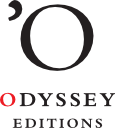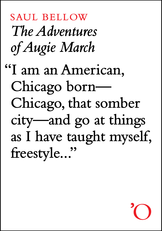The Adventures of Augie March by Saul Bellow
The great novel of the American dream, of “the universal eligibility to be noble,” Saul Bellow’s third book charts the picaresque journey of one schemer, chancer, romantic, and holy fool: Augie March. Awarded the National Book Award in 1953, The Adventures of Augie March remains one of the classics of American literature.
An impulsively active, irresistibly charming and resolutely free-spirited man, Augie March leaves his family of poor Jewish immigrants behind and sets off in search of reality, fulfillment, and most importantly, love. During his exultant quest, he latches on to a series of dubious schemes – from stealing books and smuggling immigrants to training a temperamental eagle to hunt lizards – and strong-minded women – from the fiery, eagle-owning Thea Fenchel, to the sneaky and alluring Stella. As Augie travels from the depths of poverty to the peaks of worldly success, he stands as an irresistible, poignant incarnation of the American idea of freedom. Written in the cascades of brilliant, biting, ravishing prose that would come to be known as “Bellovian,” The Adventures of Augie March re-wrote the language of Saul Bellow’s generation.
“All of Chicago seems gathered into the book, and eventually all of America, and much of human history as well… One must love the book on artistic grounds – for its comedy, its generosity, its density, its linguistic materials – and also, still, for its hopefulness.”
The New Yorker
The Adventures of Augie March was included in Time magazine’s 100 best novels and listed as #81 on the Modern Library’s list of the best 20th-century novels. Saul Bellow was the recipient of the 1975 Pulitzer Prize, the 1976 Nobel Prize for Literature, and the 1988 National Medal of Arts. He is the only writer to have won the National Book Award three times.


